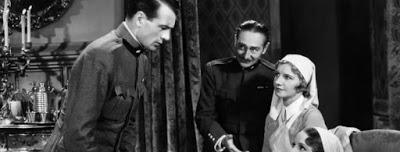Format: Streaming video from Kanopy on laptop.

This is another of those reviews where I feel I have to come clean at the start. I studied literature in college and have a BA in it. That means that I’ve read a bunch of classics including my share of the works of Ernest Hemingway. The truth of the matter is this: I think Hemingway was one of the finest craftsman of short stories the English language has ever seen, but I hate his novels. I hate them. I find his style to be oppressive when it goes on too long, and the man was incapable of writing a woman character who was anything other than a conduit for a man’s ego. This left me with scant hope for A Farewell to Arms.
And sure, I expected this to be grim. This also happens to be a case where my set against the source material could be slightly mollified because the movie diverges significantly from the book to the point where Hemingway himself evidently hated this film. But, it’s still Hemingway and it still manages to use a lot of his dialog from the book. Worse, the characters are absolutely drawn from the novel, and that’s where I have the biggest problem with the story.
Simply put, an American named Frederic (Gary Cooper) is an ambulance driver in the Italian army during World War I. He returns from the front one day to be greeted by his friend Rinaldi (Adolphe Menjou). Rinaldi has a crush on a local nurse at the hospital and has attempted to set up Frederic with her friend so that he can spend time with her. The nurse in question is Catherine (Helen Hayes), who decides she likes Frederic a lot more.
They conduct a whirlwind romance which includes Frederic deflowering the young nurse. He’s sent back to the front and is wounded. Meanwhile, behind the lines, Rinaldi is working against his friend because he’s trying to get her for himself. He has her transferred to another hospital, which is naturally where Frederic is sent when he’s wounded. The love that bloomed between the two of them blossoms there until Frederic is determined to be healthy enough to return to the front (mostly because he’s healthy enough to drink a lot). At this time, Catherine has determined that she is pregnant (and substantially pregnant, since she has the baby a few months later), but no one knows. So it’s one of those early movie pregnancies where the woman magically has a baby but looks exactly the same. Frederic heads to the front and Catherine heads to Switzerland to have the baby.
Enter Rinaldi once again, who decides that he knows better than our star-crossed lovers and decides not to forward Catherine’s letters on to Frederic. Frederic searches for her, there are complications with the pregnancy, and he rushes to be with her. And true to form, Hemingway gives us plenty of terrible, terrible irony in the ending. Sorry if that’s a spoiler, but this story has been around for 85 years or more.
My problem with Hemingway’s novels is not simply his choppy prose that I find maddening when it goes beyond a page or two. It’s also his characters, and more specifically his female characters. In Hemingway stories, especially those that are longer than a few pages, his women exist simply to become vessels for the egos of his male characters. At one point in the film (and the book, if memory serves), Catherine says something to the effect that she no longer has any desires or wants—she just wants what Frederic wants. I think that’s supposed to be a romantic sentiment, but it’s actually pretty creepy. And it’s not the only time it happens. Catherine falls for Frederic immediately and she’s suddenly unable to do a single thing that doesn’t involve him.
That’s a problem, and it’s pervasive in the film. While much of the plot didn’t make it to the screen (and I admit, it’s been a long time since I read the book), Hemingway’s misogyny did. Catherine is nothing more than an extension of Frederic. I have real issues with that.
I’m happy to admit that beyond that, it’s actually a pretty good story. If you are okay with movies that have a significant downbeat ending, the story itself is good, and the ending is pretty great (and accurate). More on the war would be worth including here, and that evidently is the biggest area in which the movie differs from the film.
So let’s talk about what works. I like Gary Cooper. I also like Helen Hayes. It’s hard not to like them. They actually make a cute couple, especially with her being so tiny next to the towering Cooper. There are some excellent moments of early cinematography. This is especially evident in the point-of-view shot from Cooper’s perspective of the two meeting in the hospital after he has been wounded. For a few moments, our entire field of vision is nothing more than Hayes’s huge, expressive eyes.
The truth is that I didn’t hate this. It’s depressing and it hasn’t aged very well, but I liked it a little more than I expected to, so I guess that’s a win.
Why to watch A Farewell to Arms: Helen Hayes and Gary Cooper.
Why not to watch: Even in non-accurate adaptations, Hemingway’s characters are infuriating.
